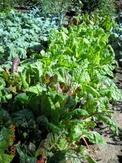Nutrition and Weight Loss
Schedule here

Eat what's right for you! Eat enough protein to sustain you in your activities along with green vegetables and fats in the right proportions. Sara will guide you based on your blood glucose levels, body type, metabolism, ancestry and goals. How about a green protein shake? Watch video at bottom!
Avoid starchy carbohydrates like potatoes, rice, bread, pasta, grains, and sugars. Let your broccoli, green beans, asparagus, spinach, kale, and salad provide you with fiber and nutrients grown in the sun.
Buy a glucometer to track your blood sugar. This is essential to keep your blood sugar below 110 as Dr. Ritamarie Loscalzo, D.C. recommends. She is an expert!
Notice the glycemic index of foods. That's the rate at which food converts to sugar, triggering insulin to store your food as fat if you overload. Eat foods within a range of 25 to 75. AVOID foods with a high glycemic index include bananas, papayas, mangoes, carrots, beets, potatoes, bread, pasta, rice, etc. Stay away from the cookies, cakes, and sugars, especially high fructose corn syrup and all artificial sweeteners!
As for fats--you need them. Every cell in your body has a membrane composed of a fat or lipid layer. You need saturated fat, preferably in the form of organic butter, virgin organic cold-pressed olive oil or coconut oil. Stay away from polyunsaturated fats like vegetable oils (look on the bottle) which have been linked to tumor formation.
For the athlete, you need at least 40 grams of protein for every 100 pounds you weigh, and that's a minimum. (Serious bodybuilders eat much more than that.) If you are a vegetarian, make sure you eat enough protein, and that you tolerate soy if that's your main source of protein. Others prefer pea protein which comes in many protein powders. Keep in mind your carbohydrate levels, especially glucose (stay below 110) to avoid weight gain, elevated triglycerides, and inflammation in your body. Some health professionals recommend eating organic, grass-fed meats to activate the pancreas which produces important enzymes to fight cancer. Those who come from colder climates may need more fat and meat to stay warm and feel healthy.
Intermittent Fasting offers many benefits but may cause loss of muscle mass. See this NYTimes article.by Anahad O'Connor (9/28/2020).
Exercise is a key to health. You can develop strength and mobility at any age! as well as maintain muscle mass if you lift weights, and raise your heart rate 4-5 times a day, or do 20 minutes daily, by swimming, jogging, biking, or other activities. If you find your blood sugar level is above 110, you can do bursts of high intensity exercise for 2 minutes to lower that level, sometimes by as much as 20%! Go for those 2" bursts throughout the day. You can get your doctor's permission to start an exercise program yourself, or join a gym, or be with friends to get you going. Sara can make sure your technique is correct and keep you motivated by setting up a structure big enough to keep you on target with your goals!
Avoid starchy carbohydrates like potatoes, rice, bread, pasta, grains, and sugars. Let your broccoli, green beans, asparagus, spinach, kale, and salad provide you with fiber and nutrients grown in the sun.
Buy a glucometer to track your blood sugar. This is essential to keep your blood sugar below 110 as Dr. Ritamarie Loscalzo, D.C. recommends. She is an expert!
Notice the glycemic index of foods. That's the rate at which food converts to sugar, triggering insulin to store your food as fat if you overload. Eat foods within a range of 25 to 75. AVOID foods with a high glycemic index include bananas, papayas, mangoes, carrots, beets, potatoes, bread, pasta, rice, etc. Stay away from the cookies, cakes, and sugars, especially high fructose corn syrup and all artificial sweeteners!
As for fats--you need them. Every cell in your body has a membrane composed of a fat or lipid layer. You need saturated fat, preferably in the form of organic butter, virgin organic cold-pressed olive oil or coconut oil. Stay away from polyunsaturated fats like vegetable oils (look on the bottle) which have been linked to tumor formation.
For the athlete, you need at least 40 grams of protein for every 100 pounds you weigh, and that's a minimum. (Serious bodybuilders eat much more than that.) If you are a vegetarian, make sure you eat enough protein, and that you tolerate soy if that's your main source of protein. Others prefer pea protein which comes in many protein powders. Keep in mind your carbohydrate levels, especially glucose (stay below 110) to avoid weight gain, elevated triglycerides, and inflammation in your body. Some health professionals recommend eating organic, grass-fed meats to activate the pancreas which produces important enzymes to fight cancer. Those who come from colder climates may need more fat and meat to stay warm and feel healthy.
Intermittent Fasting offers many benefits but may cause loss of muscle mass. See this NYTimes article.by Anahad O'Connor (9/28/2020).
Exercise is a key to health. You can develop strength and mobility at any age! as well as maintain muscle mass if you lift weights, and raise your heart rate 4-5 times a day, or do 20 minutes daily, by swimming, jogging, biking, or other activities. If you find your blood sugar level is above 110, you can do bursts of high intensity exercise for 2 minutes to lower that level, sometimes by as much as 20%! Go for those 2" bursts throughout the day. You can get your doctor's permission to start an exercise program yourself, or join a gym, or be with friends to get you going. Sara can make sure your technique is correct and keep you motivated by setting up a structure big enough to keep you on target with your goals!
